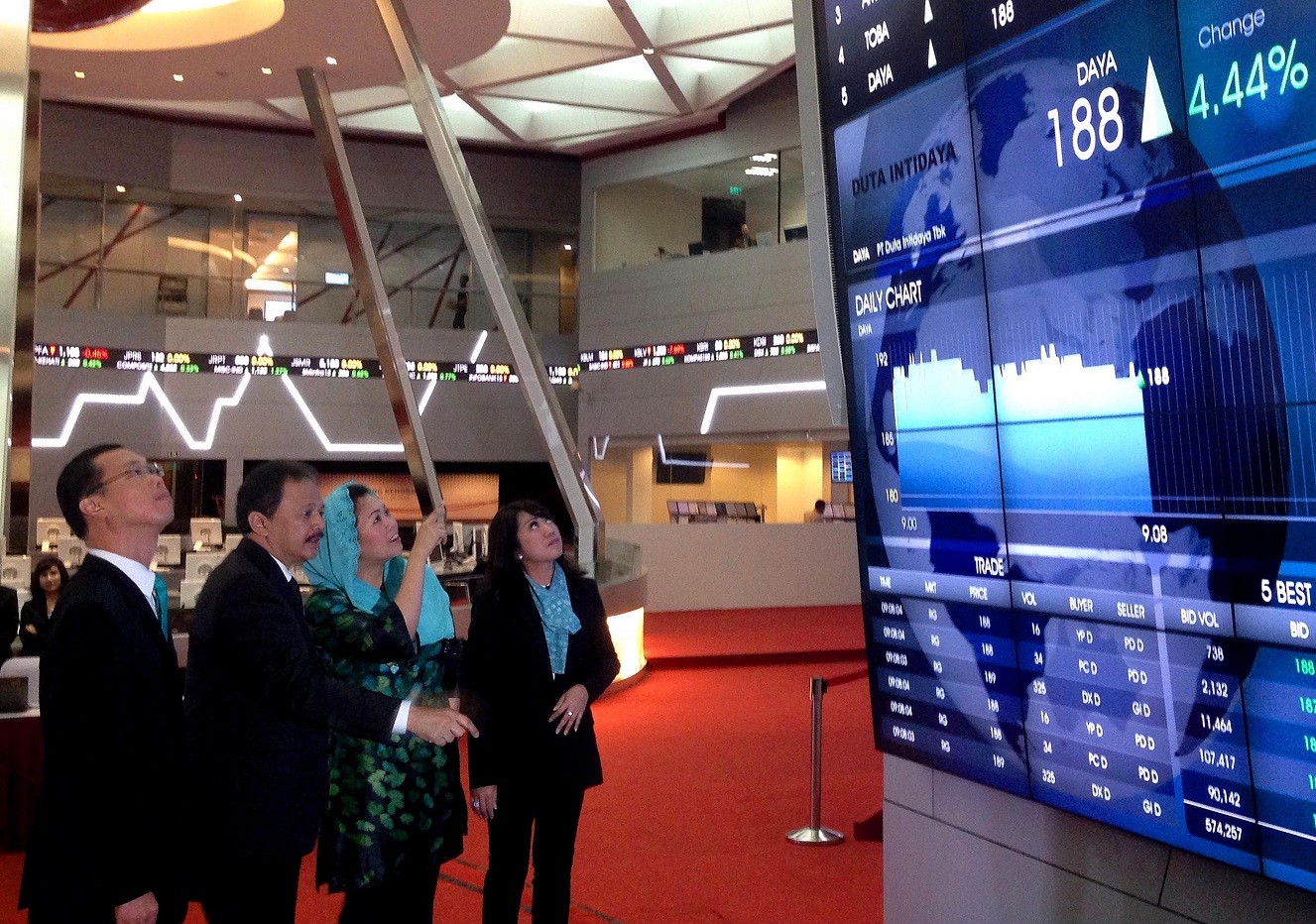Enhancing power of capital market
Unfortunately, despite the rapid growth of trading activities at the IDX, there is still much room for improvement. If we take a look at the number of companies listed on the IDX, one simply cannot take a proud stance, especially compared to neighboring markets. There are more than 1,000 companies listed on Singapore’s stock market and more than 900 in Malaysia. Meanwhile, we only have around 500 companies under our belt, an intriguing phenomenon given our larger market and economy.
Change Size
 Indonesia Stock Exchange (IDX) president director Tito Sulistio (second left), PT Duta Intidaya (DAYA) independent director Sukarnen (left), president commissioner Yenny Wahid (second right), and president director Lilis Mulyawati (right) looks at the the trading panel at IDX building in Central Jakarta on June 28, 2016. (The Jakarta Post/Viriya Paramita S.)
Indonesia Stock Exchange (IDX) president director Tito Sulistio (second left), PT Duta Intidaya (DAYA) independent director Sukarnen (left), president commissioner Yenny Wahid (second right), and president director Lilis Mulyawati (right) looks at the the trading panel at IDX building in Central Jakarta on June 28, 2016. (The Jakarta Post/Viriya Paramita S.)
A
lmost four decades after the reactivation of the stock exchange in Indonesia, it is about time to take our capital market to the next level.
The efforts of the Indonesia Stock Exchange (IDX) to educate people and increase their knowledge about investing in the capital market are something we should all appreciate.
As an emerging economy striving to be placed among developed countries in the future, Indonesia needs to further strengthen the roles of the capital market, money market, commodity market and derivative market in the country’s economy.
They are the four mandatory institutions in modern economies around the world.
Unfortunately, despite the rapid growth of trading activities at the IDX, there is still much room for improvement. If we take a look at the number of companies listed on the IDX, one simply cannot take a proud stance, especially compared to neighboring markets.
There are more than 1,000 companies listed on Singapore’s stock market and more than 900 in Malaysia. Meanwhile, we only have around 500 companies under our belt, an intriguing phenomenon given our larger market and economy.
From the investor side, the number is even less encouraging. According to the IDX, as of November 2015, the number of Indonesian investors totaled only 427,000, a tiny figure compared to juggernaut Malaysia with 10 million retail investors ( 36 percent of its total population).
To make this unfortunate situation even more depressing, 60 percent of investments are sourced from foreign capital. Thus, with a free foreign exchange system implemented in Indonesia, our capital market is vulnerable to capital flight should the domestic situation mess up.
The IDX has taken a good first step as mentioned and it goes without saying that the stock exchange needs to step up its efforts and pick up the pace to boost the power of the capital market.
It can be argued that educating prospective individual or retail investors is a somewhat “easy task”. The IDX has the tools, willingness and time to approach prospective retail investors.
And with more and more people becoming financially savvy, exposure to the stock market and the shifting preference of investment from fixed assets toward capital market products will eventually happen, albeit slowly.
Moreover, the rise of the internet and technology, which makes it easier for people to invest and trade, really plays into the IDX’s hands. Despite the IDX’s centralistic presence, securities trading can be done in any city in Indonesia, from Sabang to Merauke. So, in terms of coverage of investors, is not really a big deal.
The toughest challenge, actually, is in encouraging more and more companies to go public. Unfortunately, the advance of technology is not offering much help in this case. The best approach must be made personally to each prospective initial public offering (IPO) company, which means the incorporation of more representative offices in regions beyond the IDX’s traditional playground.
The IDX should continue its good work of collaborating with local administrations, Financial Services Authority (OJK) representative offices and the Indonesian Chamber of Commerce and Industry (Kadin).
The idea of a special “task force” targeting small and medium enterprises, family firms and other types of companies that currently have little exposure to the capital market must also be considered.
An ambitious target must be set of more than 1,500 companies being listed within the next decade. After all, Indonesia is part of the top 20 biggest economies right now and is predicted to make the top 10 by 2030.
All parties should work together to grow Indonesia’s capital market to an appropriate size, reflecting that.
Enhancing the capital market will benefit all parties: the country, companies and investors.
For the country, a strong capital market will relieve the government of the financial burden of driving the domestic economy.
Privatization can be encouraged, job creation can be fostered, and if the private sector can do a good job, as reflected in the strong capital market, the government can focus on what matters most to the people, such as education, infrastructure, the military, natural disaster recovery and so on.
We must not be afraid of the possibility that the government might lose control, as it has absolute power in making the laws and regulations that limit the private sector.
After all, the 1945 Constitution specifically mentions “control” and not “own”.
For companies, the capital market represents a new source of funds that can be obtained inexpensively. The capital obtained will be beneficial for companies in the long run, giving more benefits compared to capital obtained from bank debt.
Furthermore, the spread of ownership as a consequence of the listed companies will encourage management to be more transparent, implementing good corporate governance that will eventually yield much improved performance.
Last but not least, investors will also reap the benefits. The relatively small capital needed to invest in stocks compared to fixed assets such as property means everyone can invest in the capital market. If the capital market can be run professionally, with the help of a regulating institution such as the OJK, it will create the ultimate advantage: The equitable distribution of prosperity.
***
The author is a business consultant and investment practitioner in Jakarta who holds an MSc in engineering from University College London under the LPDP Scholarship. The views expressed are his own.
---------------
We are looking for information, opinions, and in-depth analysis from experts or scholars in a variety of fields. We choose articles based on facts or opinions about general news, as well as quality analysis and commentary about Indonesia or international events. Send your piece to community@jakpost.com.









